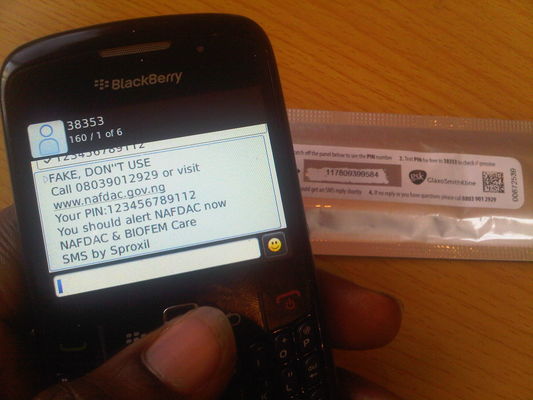Did you know that 700,000 lives are lost annually due to fake malaria and tuberculosis drugs? Not enough people are aware of the problem, according to Alden Zecha, CFO of IPIHD/SEAD innovator Sproxil. Zecha spoke to Duke’s Fuqua School of Business as part of Duke’s entrepreneurship week on September 16th, 2014. The key to saving these lives is ensuring that the authentic, clearly and correctly labeled medications end up in the hands of those who need them.
Sproxil holds that key. Founded in 2009, Sproxil addresses the problem of counterfeiting by enabling the person taking medication to verify product authenticity at the point of purchase by using a security label and a free text message. Each package of a drug contains a label with a one-time use, multiple-digit random number. The purchaser can send a free text to Sproxil with this code and find out immediately if the medication has been authenticated. It is a low–cost solution that ensures low-technology customers that they are receiving the correct medication. Sproxil’s approach is detailed in a new IPIHD report available here.

Audience members for Duke’s entrepreneurship week, Sept 2014
If you go to Sproxil’s website you will see a counter at the top of the webpage that shows that the company is very close to crossing the 12 million mark for medications verified in five countries. Sproxil plans to expand across industries and countries. When asked about the biggest challenge facing Sproxil in scaling their intervention, Zecha responded with what he considered the two main obstacles: cost and lack of awareness. Anti-counterfeit technologies are expensive even with financial support and a systemwide implementation may not always be financially feasible. Zecha also emphasized the importance of ensuring that business executives in international markets have a complete understanding of the impact counterfeit medications have on healthcare globally. Despite the challenges ahead, Sproxil will not give up improving and working to scale their model. Zecha encouraged other entrepreneurs to do the same: “As a social entrepreneur there will be many challenges to overcome but be sure to make them learning experiences. If no one tells you you’re wrong, you’re probably not doing something innovative enough.”

